The third episode of The Magicians packs in a lot of stuff, but it’s mostly backstory and side-quests, to which Quentin is variously a bystander and a… well, kind of a jerk. But first, we need to figure out what each first-year student’s discipline is, because magical specialties are cool, and no one can resist a Sorting Hat Professor. (For the record, I suspect the Physical Kids are probably mostly Slytherins, but Alice is certainly a Ravenclaw and Eliot might secretly be a Hufflepuff.)
Spoilers follow!
As Dean Fogg very ominously explains that magic is dangerous and can, if you are not properly trained, change you (a powerful warning coming from a guy with new eyeballs), we watch Julia continuing her studies with the hedge witches. Her complicated relationship with head-witch-in-charge Marina—skeptical, encouraging, matter-of-fact—is mostly shown in glances and quirked eyebrows, with the occasional speech about how Julia needs fewer distractions. Julia’s not quite ready to cut her safety-net boyfriend loose, despite their awkward conversations in her absurdly large “Brooklyn” apartment.
Fogg, having ended his speech with an announcement that Brakebills staff will be testing students to determine their strengths, quickly establishes Alice’s discipline, while Sunderland (bless Anne Dudek and her quizzical face) tries an increasingly entertaining series of ways to figure out what the hell Quentin is good at. Nothing to do with rocks. Nor bonsai trees. Nor much of anything, really. Apparently, you can be an undecided magician. Alice, on the other hand, is a phosphoromancer. “I bend light,” she says, making her hand disappear like it’s as easy as blinking. Phosphoromancy is a type of physical magic and the Physical Kids have some extra room in their cottage, so she and Quentin, conveniently, both wind up there.
First they have to get in the building, though. I missed the book version of this entrance exam (so to speak), which was much longer and more creative, but I’ll trade long, potentially expensively effects-laden scenes for more time with Eliot, who welcomes Alice and Q into the cottage with aplomb and alarmingly green cocktails. He’s like a troublemaking den mother with a soft spot for a “high-strung super-nerd.” (We could all use one of those in our lives.)
Whatever’s in those drinks, it’s pretty strong, as it’s not long before a tipsy Alice is confessing that she wants to try again to contact her dead brother Charlie. Her confessions also include “You have a stupid face,” so you’d think maybe we shouldn’t take her too seriously, but no: minutes later she and Q are notably less drunk and following a bespelled match to Brakebills’ creepy bottomless fountain. What’s it go to do with Charlie?
The Charlie plot exists largely to demonstrate some spectacularly unpleasant magical consequences, and to show us that Margo, when she puts her mind to it, can be quite useful. “Margo’s discipline is gossip,” Quentin cracks, not inaccurately, as Eliot leads him away for a side quest. Margo knows something about everyone at Brakebills, and most of the previous classes as well, so eventually Alice sucks it up and asks for her help. Both halves of the quartet eventually head into the city (How? Teleportation? Special Brakebills bus route?). Margo and Alice search out Brakebills dropout Emily Greenstreet, who may know something about Charlie; Eliot and Quentin are chasing down a book that’s gone missing from the Physical Kids’ library. As Kady liberated that book for Marina, their search—guided by the missing book’s mate; just go with this—leads them straight to the hedge witches.
And here’s where Quentin shows his true colors. He’s got nothing useful to say to Julia, and when she follows him onto the sidewalk, demanding that he talk to her, he snaps. The things he throws in her face don’t stick because they’re defensive nonsense: He accuses her of using his affection, of “slumming” because she didn’t get into Brakebills, but he’s really angry that (a) she never loved him back, and (b) she wouldn’t accept defeat and let him be, in his mind, better than her. Brakebills is better than hedge witches, and therefore Quentin is better than Julia. The notion that there are other ways to exist—to succeed—in the world goes outside Quentin’s established narrative for himself, and when that narrative is threatened, he lashes out.
Julia sees through him, of course, because they were best friends, and because she knows they both love magic—and they love it more than they could possibly each other. “Is it like the secret heart of what you always were?” she asks Q, who doesn’t answer. His respect for other people’s feelings and desires is in short supply this week, as he spends a good portion of this episode telling his friends what to do, or what they should be doing. Whether his opinion is the right one when he and Alice finally do encounter Charlie—or what’s left of him—is up for debate. Would Alice have saved Charlie, or was Quentin’s call the right one?
The Magicians continues to be upfront about Quentin’s less likable qualities, which is great; putting Julia’s story right alongside his makes this pretty unavoidable. This episode isn’t really about Quentin so much as it’s about the way he is useful or terrible to other people: Alice all but baits him into helping her by accusing him of not caring; Eliot drags him off to find the missing book because, well, he can; when Q’s not yelling at her, Julia is actually learning things. Practical things. If you look at the whole picture, you might see a big question mark in the middle: Why does Quentin matter? Why does his story get so much more time than Julia’s? He’s no specialist; he can put together a spell when need be, but he’s not notably powerful. He’s not empathetic, like Eliot, who hides his secret kindness side behind snark and cocktails; he’s not unusually powerful, like Penny, who sits down to meditate and suddenly finds himself halfway around the world. He’s not passionate, like Julia, who is busting her ass while Q reads books under pretty trees. He’s ordinary, defensive, self-protective, occasionally dumb as a post, and in possession of a mysteriously nonspecific magical talent.
But he knows about Fillory. Unless those dreams are just bonkers dreams. Based on next week’s preview—a way, way off-book teaser that suggests Quentin’s going to have an “Is it all in my head?” episode that will undoubtedly pale in comparison with the greatest of all such episodes, Buffy’s “Normal Again”—we may have to wait a bit longer to get back to the magical land of not-Narnia.
Stray observations:
- Jason Ralph’s sheepish face in the scene where Penny yells at Quentin to close his mind is everything I ever wanted from book-Quentin. (Also, is it just me, or does Penny’s faded tattoo look not entirely unlike a Dark Mark?)
- Eliot’s golf clap. Eliot’s response to Kady. Eliot’s dry matter-of-factness about book sex. “Love wins.”
- Kady was a minor presence in this episode—other than breaking down the door of the Physical Cottage quite dramatically—but continues to have an amazing array of what I can only describe as reverse V-neck drapey garments.
- Julia, girl. Let go of the safety net. He is very bland and has bad sweaters.
- “Did you ever burn ants when you were a kid?” “No, that’s horrifying.”
- Revealing Penny as a traveler—a magician who can move between places and potentially between worlds—might make for some interesting changes to the plot later in the season.
- Fogg’s explanation about how important the structure is at Brakebills is either very, very true, or very, very party-line/“You must go to college or you will fail in the world” b.s. I’m inclined to not entirely trust him.
- Nothing they could have put on screen for what happened to Emily Greenstreet’s face could be as horrible as what I was imagining.
- “I like competition.” This week, Margo is a lot more like her book counterpart, Janet, than she’s been up until now.
Molly Templeton would like to model her wardrobe after Julia’s. If you can figure out where that drapey cardigan came from, please come tell her on Twitter.










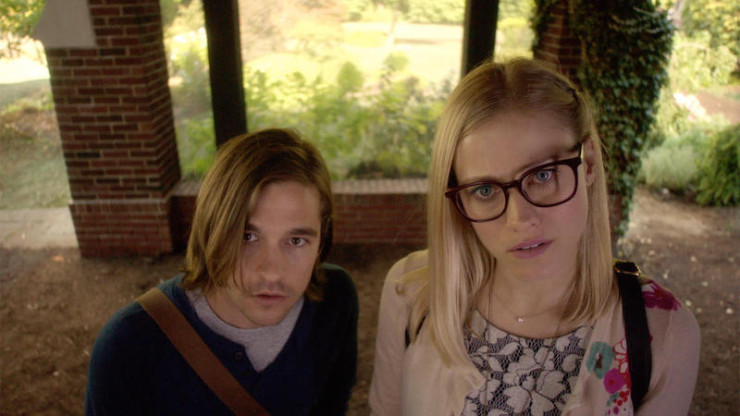
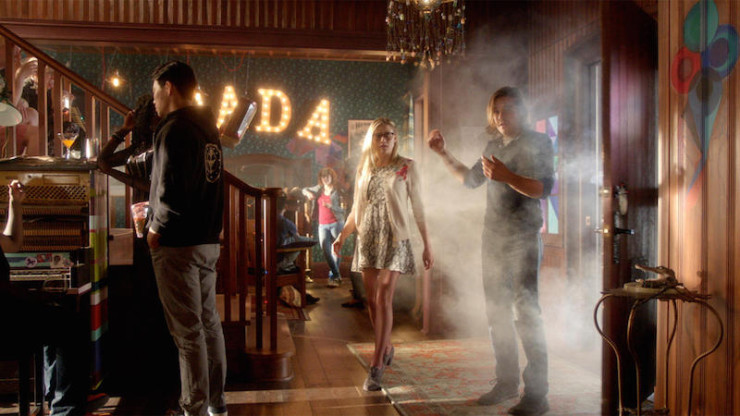
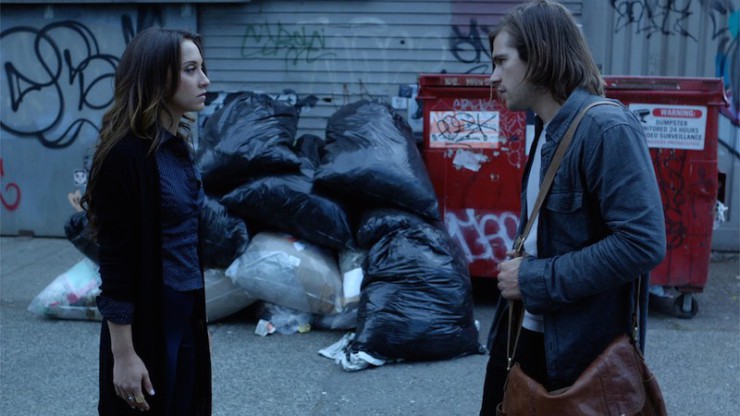
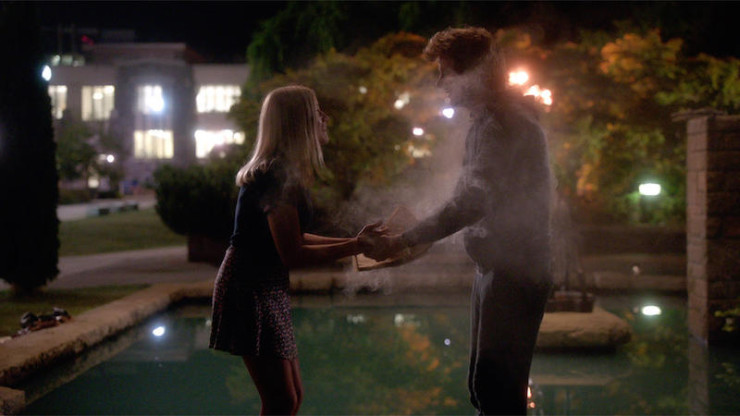
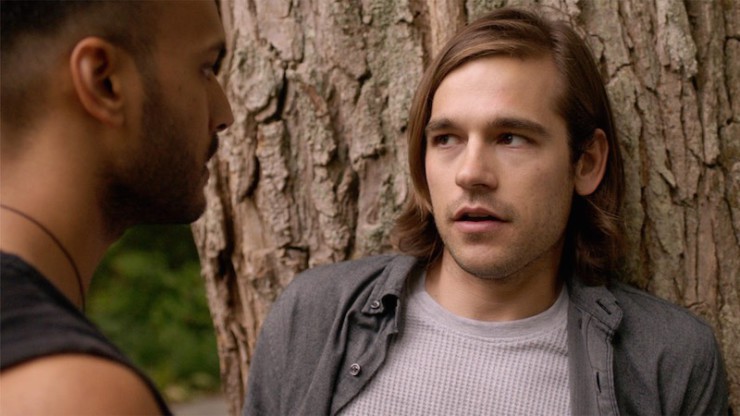
I’m finding your reviews of this series much more entertaining than the episodes themselves :)
I’m quite disappointed with the show so far, hopefully it’ll get better.
Alice is a reckless, arrogant and delusional idiot. Her attempt to reach her brother have already resulted in one death and three serious attacks. Quentin was right to stop her as she almost got him killed. She needs to have her mind wiped and expelled from Brakebills.
I tried the show on a whim a couple days ago and now I’m all caught up, and… I’m surprised at how much I’m liking it. Yes, the characters are occasionally unlikable and certain things could be better, but on the whole I’m really digging it.
Well, they certainly can’t be accused of hewing too closely to the books. That aside, I’m starting to warm to a blond Alice, and I’m interested to see where they’re going to take this, and how long they’re going to take to get there.
Quentin was indeed being an arsehole to Julia, seeing as last episode he went straight to ringing her as soon as it looked like he was going to be kicked out and lose magic forever. One episode later he’s apparently having trouble understanding why Julia is still trying to study any magic she can. Empathy Q, even if you don’t get it you should be smart enough to fake it.
Well, he was being a jerk, yeah, but I don’t think he was totally without empathy, just that he felt he knew her enough that he’d already decided what the story with her was… from his perspective (where he’s put her a bit on a pedestal) she is awesomely successful at everything, except, as it turns out, magic. Whereas he fails at everything BUT magic (and even that, he’s no great shakes at). So seeing her struggle and (in his eyes, from what Eliot’s told him of the Hedge Witches) get into dangerous and potentially degrading stuff just because she wants to succeed (and probably be better than him again) at the one thing he’s good at, the same thing she put behind her (and their last major interaction, aside from her birthday, was when she got in a fight with him because he wouldn’t “grow up” and put magical stuff behind him too, so obviously, she couldn’t REALLY care about it the way he does), isn’t just crazy and self-destructive and something he needs to try to dissuade her from, but feels also like it’s reflective of how he felt about their previous relationship: that she needed someone she felt was lower than her that felt she was awesome, to feel better about herself, more than she actually liked him for him. I like to think towards the end of that conversation (when she spoke of magic the same way as he felt) he was starting to realize what an ass he’d been, but by then, she’d already started walking away and (as a fairly socially awkward type myself) that makes it a lot harder to speak up and admit you’ve been an ass.
Now I can see what people meant by how unlikable the characters are. But the show does present it as a bad thing, so it stays far more enjoyable than I imagine the books to be. Alice won’t consider the possibility that she might be wrong and won’t ask the teachers for help (it’s might be because she can’t, but the fact that the students can’t trust the teachers probably explains at least 90% of the accidents at Brakebills), so she lashes out at Quentin for saving her life. Then Quentin is an arsehole to Julia; he had a point when he told her that hurting herself was a sign she wasn’t right, but here, he’s just awfully condescending. If the hedge witches are so bad, why doesn’t he suggest teaching her magic himself? Finally Julia would rather lie to her boyfriend than sharing her discovery that the world is much more than what we think. Well at least it won’t come as a shock if any of them dies.